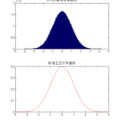We study a sequential elimination contest where players are filtered prior to the round of competing for prizes. This is motivated by the practice that many crowdsourcing contests have very limited resources of reviewers and want to improve the overall quality of the submissions. We first consider a setting where the designer knows the ranking of the abilities (types) of all $n_1$ registered players, and admit the top $n_2$ players with $2\leq n_2 \leq n_1$ into the contest. The players admitted into the contest update their beliefs about their opponents based on the signal that their abilities are among the top $n_2$. We find that their posterior beliefs, even with IID priors, are correlated and depend on players' private abilities. We explicitly characterize the symmetric and unique Bayesian equilibrium strategy. We find that each admitted player's equilibrium effort is increasing in $n_2$ when $n_2 \in [\lfloor{(n_1+1)/2}\rfloor+1,n_1]$, but not monotone in general when $n_2 \in [2,\lfloor{(n_1+1)/2}\rfloor+1]$. Surprisingly, despite this non-monotonicity, all players exert their highest efforts when $n_2=n_1$. As a sequence, if the designer has sufficient capacity, he should admit all players to maximize their equilibrium efforts. This result holds generally -- it is true under any ranking-based reward structure, ability distribution, and cost function. We also discuss the situation where the designer can only admit $c<n_1$ players. Our numerical results show that, in terms of the expected highest or total efforts, the optimal $n_2$ is either $2$ or $c$. Finally, we extend our model to a two-stage setting, where players with top first-stage efforts can proceed to the second stage competing for prizes. We establish an intriguing negative result in this setting: there does not exist a symmetric and monotone Perfect Bayesian equilibrium.
翻译:顺序淘汰竞赛与全付拍卖。我们研究了一个顺序淘汰竞赛,其中竞赛之前会对玩家进行筛选来争夺奖品。这是由许多众包竞赛在评审资源非常有限且想提高作品的总体质量的实践所促成的。我们首先考虑了一种情况,即设计者了解所有$n_1$注册玩家的能力(类型)排名,并将前$n_2$名玩家纳入竞赛。被接受参赛的玩家们基于他们的能力排名成为前$n_2$名的信号来更新对他们对手的信念。我们发现,即使是具有独立同分布先验的情况下,他们的后验信仰是相关的,并且取决于玩家的私人能力。我们明确地表述了对称的、唯一的贝叶斯均衡策略。我们发现,当$ n_2 \in [\lfloor{(n_1+1)/2}\rfloor+1,n_1] $时,每个被接受的玩家的均衡努力程度随$ n_2 $的增加而增加,但通常在$n_2 \in [2,\lfloor{(n_1+1)/2}\rfloor+1] $时并不是单调的。出乎意料的是,尽管存在这种非单调性,但所有玩家都在$ n_2=n_1 $时施加最高的努力。依次地,如果设计师有足够的容量,他应该接受所有玩家来最大化他们的均衡努力。这个结果是普遍的,它适用于任何基于排名的奖励结构、能力分布和成本函数。我们还讨论了设计师只能接受$c<n_1$个玩家的情况。我们的数值结果表明,在期望的最高或总努力中,最优的$n_2$是$ 2 $或$ c $。最后,我们将模型扩展到两个阶段,第一阶段表现最好的玩家可以进入第二阶段争夺奖品。我们在这个情况下建立了一个有趣的负面结果:不存在对称的、单调的完美贝叶斯均衡。


